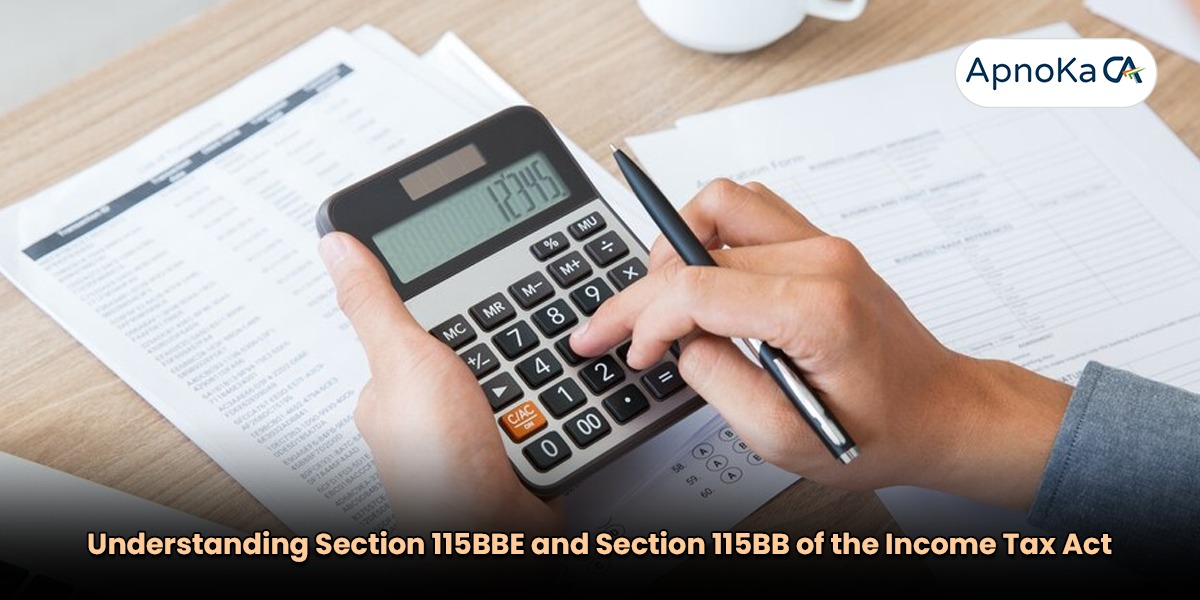# indiantaxlaw
10 posts in `indiantaxlaw` tag

Section 57 Deductions - Income Tax Act
A thorough explanation of Section 57 of the Income Tax Act, which permits deductions against income subject to the "Income from other sources" head, is given in this article. It describes the several types of deductions that are permitted under Section 57, including as interest or dividends on tradable financial assets, employee contributions to welfare programs, costs related to rental revenue, and more. The purpose of the essay is to assist taxpayers in comprehending the nuances of Section 57 and in making well-informed decisions regarding their tax compliance and planning.
.jpg)
Understanding Section 50B of the Income Tax Act: Slump Sale and Its Tax Implications
This blog provides an in-depth exploration of Section 50B of the Income Tax Act, focusing on the concept of slump sales. It explains the unique characteristics of slump sales, how capital gains are calculated, and the tax implications for both short-term and long-term gains. The blog also covers compliance requirements, exemptions, common misconceptions, and challenges, supported by real-life case studies. Essential for businesses and tax professionals, this guide aims to demystify Section 50B and provide clear insights into the taxation of slump sales.

Understanding Sections 194I and 194H of the Income Tax Act
This blog explores the details of Income Tax Act Sections 194I and 194H, clarifying the conditions for rent and commission payments that qualify for tax deduction at source (TDS). It addresses the following: application, rates, dates for deductions, deposit requirements, and the repercussions of noncompliance. It is imperative that taxpayers, business owners, and landlords who engage in commission transactions comprehend these parts to guarantee adherence to Indian tax regulations and prevent penalties. Continue reading to acquire a thorough grasp of TDS on commission and rent, along with useful examples and an overview of the main distinctions between the two parts.

Detailed Comparison of Section 115BBE and Section 115BB of the Income Tax Act
The Indian Income Tax Act includes specific provisions for different types of income, notably Sections 115BBE and 115BB. Section 115BBE targets unexplained income and aims to curb tax evasion by imposing a higher tax rate, while Section 115BB deals with winnings from lotteries, game shows, and similar sources. This blog provides a detailed comparison of these sections, highlighting their objectives, applicability, tax rates, and the consequences for taxpayers. Understanding these sections is crucial for ensuring compliance and avoiding penalties.

Understanding Sections 234A and 234B of the Income Tax Act, 1961
This blog provides a comprehensive overview of Sections 234A and 234B of the Income Tax Act, 1961. It explains the interest levied for defaults in filing income tax returns and advance tax payments, their implications, and key differences. The blog also offers practical tips for taxpayers to ensure compliance and avoid penalties.

Sections 269SS and 269T of the Income Tax Act
The Income Tax Act has provisions called Sections 269SS and 269T that limit cash transactions for loans and deposits over Rs. 20,000 in an attempt to prevent tax evasion and encourage transparency. Such amounts cannot be accepted in cash according to Section 269SS, and cash repayment is limited according to Section 269T. Penalties for noncompliance may equal the cost of the transaction. This blog offers a thorough explanation of each of these areas, as well as helpful advice on how to comply.
Navigating an Income Tax Notice Under Section 133(6): A Comprehensive Guide
This blog post provides a detailed overview of Section 133(6) of the Income Tax Act and how to handle an income tax notice issued under this provision. It covers the key points of the law, common reasons for receiving such a notice, and the steps to respond properly. The post emphasizes the importance of compliance, the consequences of non-compliance, and the role of professional assistance. Taxpayers will learn how to navigate the process of responding to a Section 133(6) notice to ensure they meet their obligations and avoid any adverse consequences.

Navigating GST for Content Creators & YouTubers: A Comprehensive Guide to Income Taxation
This article provides an in-depth guide to GST on YouTube income, AdSense, brand promotions, and affiliate marketing in India. It covers GST rates, compliance, and refunds for content creators, helping them navigate the complex tax landscape.
.jpeg)
Income Tax for YouTubers & Content Creators: Understanding Section 44AD
In the digital age, platforms like YouTube have opened up new income avenues for content creators. Understanding the tax implications of these earnings is crucial. This blog delves into the specifics of income tax for YouTubers and content creators, with a particular focus on the applicability of Section 44AD of the Income Tax Act. We explore the eligibility criteria, benefits, and potential drawbacks of opting for presumptive taxation. Detailed examples and practical tips are provided to help content creators navigate their tax obligations effectively.

June 2024 Financial Compliance: What You Need to Know
This comprehensive guide covers essential information for businesses and individuals operating in India regarding income tax, provident fund (PF), and employees' state insurance (ESI) compliance in June 2024. Understand the requirements, deadlines, and forms to be submitted to maintain compliance with Indian tax laws and regulations.
